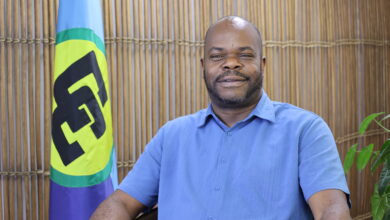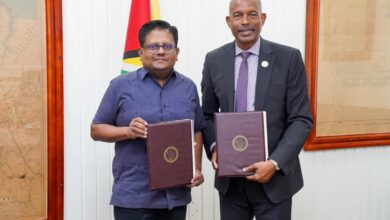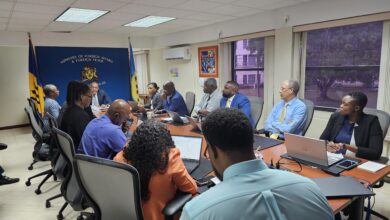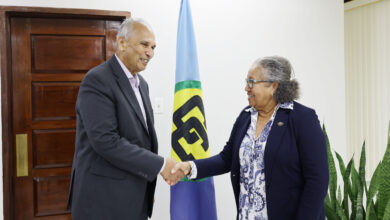Colleague of the Cabinet – Hon. Dr. Leslie Ramsammy, MP-Minister of Agriculture, Mr. Wilmot Garnett-IICA Representative to Guyana, Members of the Diplomatic Corps, Visiting Delegates, especially our female delegates, Distinguished Ladies and Gentlemen, Members of the Media. Let me extend a welcome to all our overseas Guests who are visiting Guyana for the first time and to extend a special Guyanese welcome to all of you on behalf of His Excellency- the President-Mr. Donald Ramotar, the Government and people of Guyana. Our country Guyana is an amazing blend of the Caribbean and South America, certainly a paradise for nature lovers, adventure seekers and eco tourists alike. Not to mention, Guyanese are the most hospitable people and Guyana is known as the ‘bread basket’ of the Caribbean and moreso the agriculture nucleus of the region.
It is my distinct pleasure this morning to address this Women’s Forum which is being observed under the theme “Expanding Economic Oppurtunities for Women in Agriculture in the Caribbean and the Pacific” and which is being hosted during Caribbean Week of Agriculture, which is the premier agricultural event of the Region. It is well known that women’s empowerment is a catalyst for development in every society around the world, and moreso here in the Caribbean. This is probably a great understatement, when we look at the contributions made by our women to development, especially as it relates to food and nutrition security.
Small Island Developing States (SIDS) across the Caribbean and Pacific regions differ in terms of size, population, social and economic conditions, infrastructure and standard of living. What they do have in common however, are many similar disadvantages such as being small in size, with a narrow range of resources, fragile ecosystems, excessive dependence upon international trade, and high transport and communication costs.
Women in the Caribbean and the Pacific play fundamental and significant roles in coping with these challenges on a daily basis, and have developed coping strategies and levels of resilience which enable them to continue to feed their families and their communities, protect their natural patrimony, and contribute to food and nutrition security, and ultimately to improve the social and economic stability of their respective countries.
The role of a woman is such that empowering any woman not only affects the individual, but also the family unit, the community, the society and the nation as a whole. As a matter of fact, women’s empowerment must be seen as a catalyst for growth and diversification of our economies. The empowerment of women is one of the ideals which has been actively pursued here in Guyana like many other countries, with a sense of increasing urgency.
In Guyana, Agriculture is our pride, and largely a way of life for many. We strongly believe that agriculture is a hub of economic opportunities on which women can capitalize, to create niche markets and economic independence to positively impact their quality of life. We believe that more focus needs to be placed on creating more job opportunities in the value added sector. Here in Guyana we have some excellent examples of women in the agriculture industry taking products a step further by adding value. Some of our women in the North West District grow cocoa and from that derive several products, including chocolate while other groups in Regions One, Two and Nine with the help of IICA have been engaged in the Carambola Fruit Fly Monitoring and Surveillance, Roots and Tubers Industry Development and Rural Women’s Development Project.
Today, if one cannot ignore the fact that women are rising to the challenge of securing food for their families, communities and countries in light of natural disasters, social and economic challenges and other vulnerabilities. As leaders, we are obligated to protect their right to do so. We must find new and innovative ways to create new opportunities and expand existing ones as we seek to promote more economic opportunities to support growth and development in the economies of our respective countries. Women are undoubtedly excellent nurturers. So, why shouldn’t our women be rewarded for their efforts and time? We have seen small and micro-enterprises managed by women accessing international niche markets in supermarkets, specialty food and foodservice sectors, the spa and wellness industry and the tourism sector. I am sure you will agree that this is certainly the way to go. It is our duty to provide support to them, and for all of us to ensure that such ventures remain profitable and sustainable.
There is also a greater need for financial support for women in agribusiness. Micro credit has made it possible for many women to do business. We need to make access to financing for projects to be undertaken by our women more accessible through more competitive rates which could be negotiated through incentive regimes with the commercial banks. It is therefore necessary to expand and reorient training programmes, which target skills training development in these and other new areas of agribusiness. Similarly, as a matter of urgency, we need to address the issue of packaging and labeling our products, as we seek to compete in today’s globalised world and in a highly competitive market place.
Importantly, we cannot underestimate the power of network. The theme for this women’s forum is fitting. As it suggests, it is imperative that we establish linkages between the agriculture and other industries to motivate women’s involvement, increase economic gains and secure our food and nutrition. The promotion of linkages between tourism and agriculture helps to create economic opportunities, build resilience in rural communities and enhance sustainable development in both tourism and agriculture sectors. Not to mention, the unexplored potential for the green economy. The development of unique and authentic tourism experiences on farms and within rural communities offers women and farm families the opportunity to diversify their farm income while keeping land in production and traditional practices alive. I recognize that women’s empowerment no short order and that governments cannot do it alone. Hence, we welcome partnerships and collaborations. Networks help to provide women with much needed opportunities and aptly supplement the government’s efforts to reach a wide cross section of women. I therefore wish to extend Guyana’s appreciation to IICA and its partners, as well as individuals and non-governmental organizations who have committed themselves towards ensuring that women’s empowerment becomes a reality.
The prospects for women in Agribusiness in the Caribbean and the Pacific are indeed promising… and it’s about time. The good news is that women in agribusiness are now the “new sexy” in developmental circles. Women are being targeted for support under programmes offered by public sector institutions, international development agencies, NGOs and large multinational private sector firms. Regional and international banking institutions including the Scotia Group with its Scotia Farm Programme, IDB and the COMPETE Caribbean programme, World Bank and its INFODEV facility and the Finance Alliance for Sustainable Trade (FAS) are all getting in on the action.
This will be yet another vehicle to bridge the gender divide and break traditional barriers. The alliances and networks being forged amongst women across the developing nations of the South, bodes well for a hopeful future, despite the many challenges of climate change and the many challenges small, vulnerable economies face. Ethical, fair trade, green and authentic are the new terms driving trade in the world today. The time for women in agribusiness has come and it is NOW!. Let’s act now! As Maya Angelou said and I quote ‘All great achievements require time’!
I wish you continued success during your deliberations at today’s Forum, as you seek to advance the Plans of Action developed at the Best practice Exchange Forum of SEED CAP (Supporting Economic Empowerment and Development in the Caribbean and Pacific).
I thank you.





